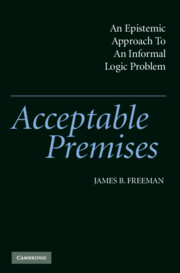Book contents
- Frontmatter
- Contents
- Preface
- Acknowledgments
- PART 1 ACCEPTABILITY: DIALECTICAL AND EPISTEMOLOGICAL COSIDERATIONS
- PART 2 STATEMENTS, BELIEF-GENERATING MECHANISMS, AND PRESUMPTIVE RELIABILITY
- PART 3 PRACTICE AND PERSPECTIVE
- 11 An Outline of the Practice of Epistemic Casuistry
- 12 Theoretical Considerations: A Commonsense Foundationalism
- Notes
- References
- Index
12 - Theoretical Considerations: A Commonsense Foundationalism
Published online by Cambridge University Press: 02 December 2009
- Frontmatter
- Contents
- Preface
- Acknowledgments
- PART 1 ACCEPTABILITY: DIALECTICAL AND EPISTEMOLOGICAL COSIDERATIONS
- PART 2 STATEMENTS, BELIEF-GENERATING MECHANISMS, AND PRESUMPTIVE RELIABILITY
- PART 3 PRACTICE AND PERSPECTIVE
- 11 An Outline of the Practice of Epistemic Casuistry
- 12 Theoretical Considerations: A Commonsense Foundationalism
- Notes
- References
- Index
Summary
We have accomplished the project of this book. We have given an account of acceptability for basic premises, explicating the concept and giving a rationale for why various conditions render certain basic premises acceptable. We also have outlined a procedure for determining in a given case whether a particular basic premise is acceptable. We conclude by putting this whole project in some theoretical or philosophical perspective. In contrast to the classical foundationalism that we criticized in Chapter 1, we call our position commonsense foundationalism. It is essentially the epistemological position Plantinga calls Reidian foundationalism (1993b, pp. 183–5) after Thomas Reid, the founder of the Scottish commonsense school of philosophy. We prefer “commonsense” to “Reidian,” because we believe first that our explication of acceptability in terms of presumption is eminently in accord with common sense. Second, other philosophers, notably Peirce and Moore, are identified with common sense, and their views may enhance the philosophical rationale for our approach. Commonsense foundationalism raises some obvious “big” questions. Why should an epistemic approach to basic premise acceptability be a form of foundationalism? Why should one seek a commonsense approach? Are there objections that should be addressed? What questions remain open? We proceed to these questions in the following sections.
WHY FOUNDATIONALISM?
Although epistemologists may debate the nature of the noetic structure for our beliefs, it is clear that argument structure is foundationalist. An argument will have basic premises, that is, premises that are not argued for at least in the context of that argument.
- Type
- Chapter
- Information
- Acceptable PremisesAn Epistemic Approach to an Informal Logic Problem, pp. 367 - 378Publisher: Cambridge University PressPrint publication year: 2004



